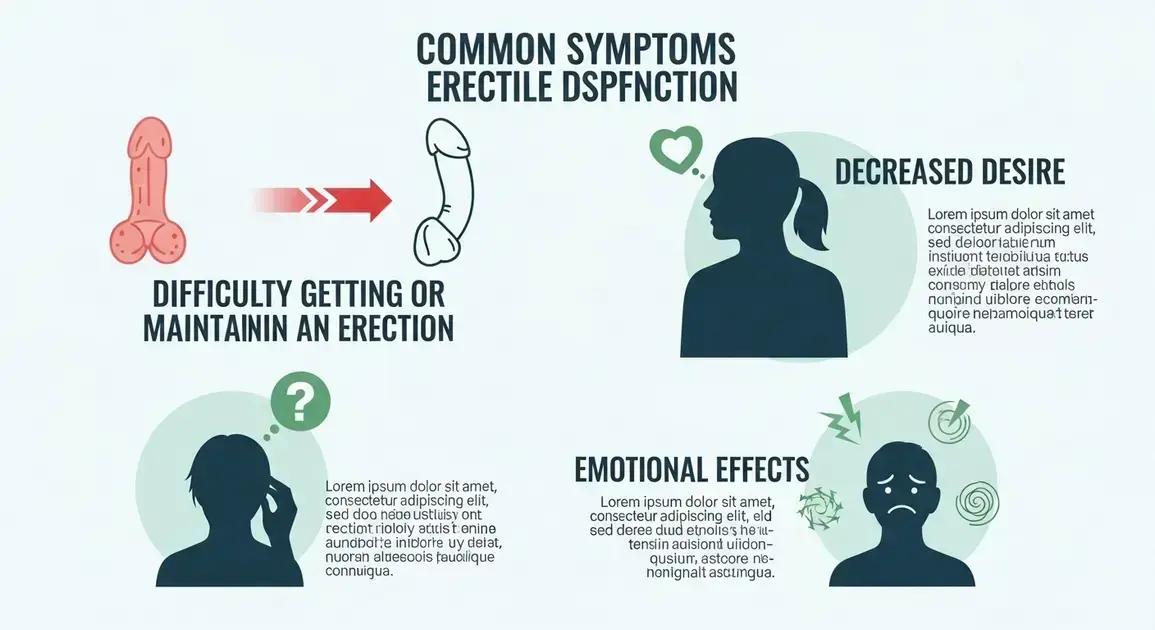Recognizing the 5 early signs of erectile dysfunction, understanding its psychological and physical factors, making lifestyle changes, and knowing when to consult a doctor can significantly aid in managing this common issue effectively.
Erectile dysfunction is a challenging condition that affects many men, yet its early signs are often overlooked. Recognizing these 5 early signs of erectile dysfunction can be crucial for addressing the issue before it evolves into a significant problem. By understanding common symptoms and psychological factors involved, men can take proactive steps to improve their sexual health. This article explores the importance of identifying these signs and encourages dialogue on the subject for better outcomes.
Understanding Erectile Dysfunction
Erectile dysfunction (ED) is a common condition that affects many men. It is defined as the inability to achieve or maintain an erection sufficient for satisfactory sexual performance. Various factors can lead to this issue, ranging from physical health problems to psychological concerns.
Types of Erectile Dysfunction
ED can be classified into two main types: primary ED and secondary ED. Primary ED refers to men who have never been able to achieve an erection, while secondary ED involves men who have had erectile function before but have experienced difficulties later in life.
Causes of Erectile Dysfunction
There are many possible causes of erectile dysfunction, including:
- Physical health issues: Conditions such as diabetes, heart disease, and obesity can impair blood flow, leading to ED.
- Hormonal imbalances: Low testosterone levels can impact sexual desire and performance.
- Medications: Certain drugs for high blood pressure, depression, and anxiety can contribute to erectile difficulties.
- Psychological factors: Stress, anxiety, and depression can significantly affect a man’s ability to perform sexually.
Impact on Quality of Life
ED can have a profound impact on a man’s life, including his self-esteem and relationships. Men may feel embarrassed or frustrated, leading to social withdrawal or relationship tension. Open communication with partners and healthcare professionals is vital for addressing these emotional and relational effects.
Diagnosis and Assessment
Understanding erectile dysfunction is essential for diagnosis and treatment. If you experience signs of ED, it’s important to see a healthcare professional. They may ask questions about health history, conduct physical exams, and recommend tests to determine the underlying cause.
Common Symptoms to Watch For

Recognizing the common symptoms of erectile dysfunction is essential for early intervention and treatment. Many men experience these signs before reaching a diagnosis.
1. Difficulty Getting an Erection
One of the most noticeable symptoms is the inability to achieve an erection when desired. This may happen occasionally or more frequently, signaling underlying health issues.
2. Trouble Maintaining an Erection
Men may find that while they can get an erection, they struggle to maintain it during sexual activity. This can lead to frustration and anxiety.
3. Reduced Sexual Desire
A decrease in sexual desire or libido can also be a symptom of erectile dysfunction. This can stem from hormonal imbalances or psychological factors.
4. Changes in Ejaculation
Some men may notice changes in ejaculation, such as delayed ejaculation or reduced volume. These changes can be linked to various physical and emotional health problems.
5. Emotional Symptoms
Erectile dysfunction can lead to emotional challenges, including feelings of embarrassment, sadness, or anxiety. These feelings can further complicate sexual performance and relationships.
Identifying these symptoms early allows for timely medical attention, which is crucial for addressing erectile dysfunction effectively.
Psychological Factors Involved
Many psychological factors can contribute to erectile dysfunction. Understanding these factors is vital for addressing and treating the condition effectively.
1. Anxiety
Anxiety, especially performance anxiety, can be a significant barrier to achieving an erection. Men may worry about their ability to please a partner, leading to stress that hinders sexual performance.
2. Depression
Depression can decrease libido and sexual function. Feelings of hopelessness and sadness can impact the desire for intimacy, further worsening erectile dysfunction.
3. Relationship Issues
Problems within a relationship, such as communication breakdowns or unresolved conflicts, can lead to emotional distance and stress, increasing the likelihood of erectile difficulties.
4. Low Self-Esteem
Men who struggle with low self-esteem may doubt their attractiveness or worthiness, which can affect their sexual performance. This feeling can create a cycle of reduced confidence and worsening erectile dysfunction.
5. Stress
Overall stress from work, financial strain, or other life challenges can also impact sexual health. When stress levels are high, it may be difficult to relax and engage in sexual activity.
Being aware of these psychological factors can help men recognize the connections between mental and sexual health. Seeking professional help or counseling may be beneficial for those experiencing these issues.
Lifestyle Changes to Improve Function

Making lifestyle changes can significantly improve erectile function and overall sexual health. Here are some effective changes men can consider:
1. Maintain a Healthy Diet
Eating a balanced diet rich in fruits, vegetables, whole grains, and lean proteins can improve circulation and heart health. Foods high in antioxidants and healthy fats, like nuts and fish, can be particularly beneficial.
2. Exercise Regularly
Regular physical activity boosts blood flow, reduces stress, and improves mood. Aim for at least 30 minutes of moderate exercise most days of the week. Activities like walking, jogging, swimming, or cycling can enhance overall health.
3. Manage Stress
Chronic stress can affect sexual performance. Incorporating relaxation techniques such as meditation, yoga, or deep-breathing exercises can help manage stress levels.
4. Get Enough Sleep
Quality sleep is crucial for hormonal balance and overall health. Aim for 7-9 hours of sleep each night to support better sexual function.
5. Avoid Excessive Alcohol and Smoking
Limiting alcohol intake and quitting smoking can greatly improve erectile health. Both substances can negatively impact blood flow and sexual performance.
Making these lifestyle changes may not only help improve erectile dysfunction but also boost overall well-being and quality of life.
When to Consult a Doctor
It’s important to know when to consult a doctor regarding erectile dysfunction. Here are some signs that indicate the need for professional help:
1. Occasional Vs. Frequent Problems
If you experience erectile issues occasionally, it may not be a concern. However, if the problems occur often or interfere with your sexual life, it’s essential to seek medical advice.
2. Emotional Distress
If erectile dysfunction causes significant emotional distress, anxiety, or relationship problems, discussing the situation with a doctor can help you find solutions and support.
3. Other Health Issues
If you have underlying health conditions such as diabetes, heart disease, or high blood pressure, consulting a doctor is crucial since these conditions can significantly impact erectile function.
4. Changes in Sexual Desire
A noticeable drop in sexual desire or libido, along with erectile dysfunction, should prompt a visit to a healthcare provider for a full evaluation.
5. Side Effects of Medication
If you suspect that your medications may be causing erectile dysfunction, talk to your doctor. They can adjust your treatment plan or suggest alternatives.
Timely consultation with a doctor can lead to effective treatment and improve your quality of life.
Understanding Erectile Dysfunction and Its Management
Erectile dysfunction (ED) is a complex condition affecting many men, but recognizing the early signs can lead to timely intervention and care.
By understanding the various factors contributing to ED, including physical health, psychological influences, and lifestyle choices, men can take proactive steps to improve their sexual health and overall well-being.
Implementing healthy lifestyle changes, being aware of symptoms, and knowing when to seek medical advice are crucial in managing erectile dysfunction effectively.
Communication with healthcare providers and partners is essential to tackle this sensitive issue and enhance relationships.
Ultimately, being informed and taking action can empower men to address erectile dysfunction and enjoy a satisfying sexual life.
FAQ – Frequently Asked Questions about Erectile Dysfunction
What are the early signs of erectile dysfunction?
Early signs include difficulty getting or maintaining an erection, decreased sexual desire, and changes in ejaculation.
What psychological factors can affect erectile dysfunction?
Factors include anxiety, depression, stress, low self-esteem, and relationship issues that can impact sexual performance.
How can lifestyle changes improve erectile function?
Healthy diet, regular exercise, stress management, adequate sleep, and avoiding excessive alcohol and smoking can significantly improve erectile function.
When should I consult a doctor about erectile dysfunction?
Consult a doctor if you experience frequent problems, emotional distress, other health issues, changes in sexual desire, or suspect medication side effects.
What treatments are available for erectile dysfunction?
Treatment options include lifestyle changes, therapy, medications, vacuum devices, and in some cases, surgical procedures.
Is erectile dysfunction a common issue?
Yes, erectile dysfunction is common and can affect men of all ages, but it’s particularly prevalent in older men.













